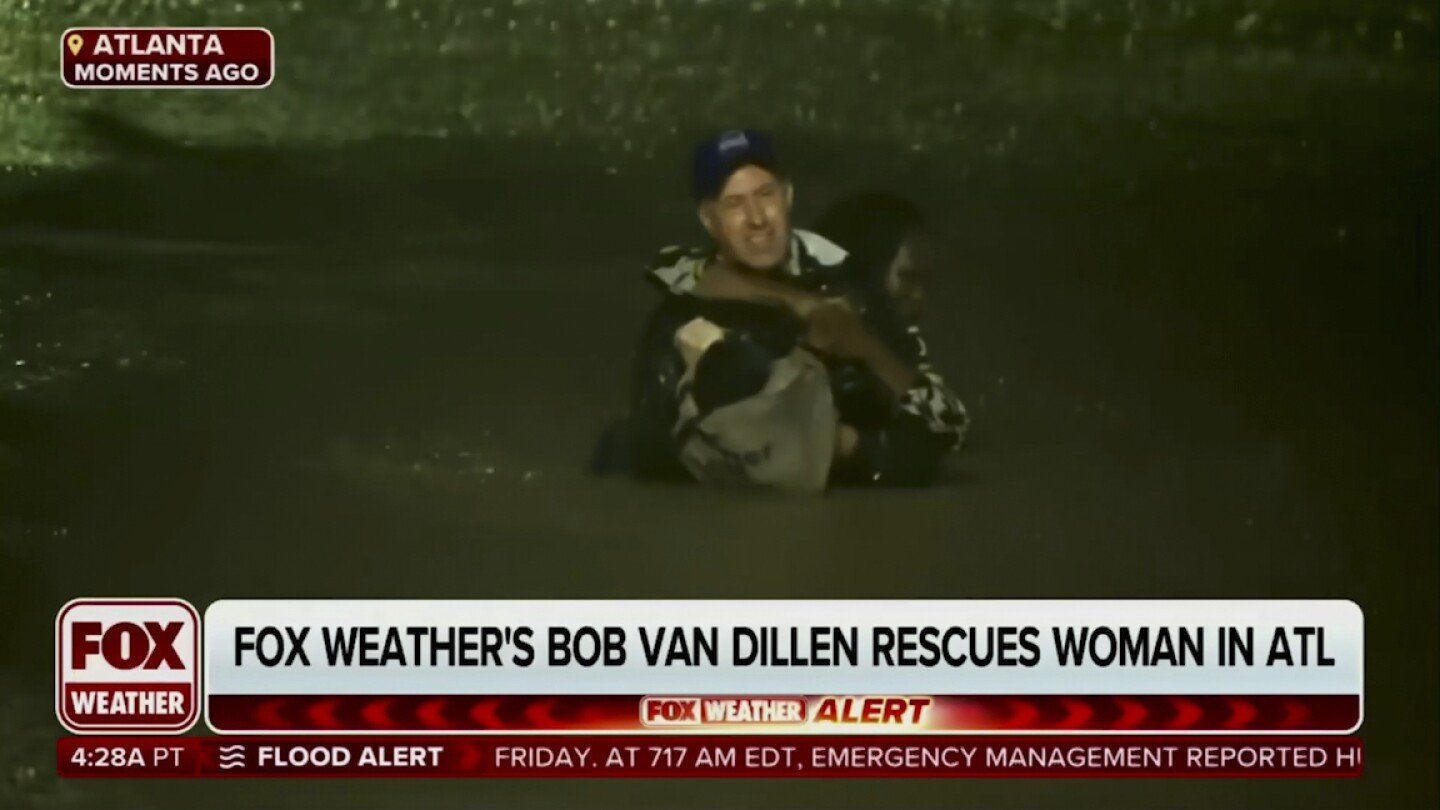A TV weather reporter in Atlanta interrupted his live shot about Hurricane Helene Friday to rescue a woman from a vehicle stranded by rising floodwaters.
In video of the rescue, standing in the rain with the submerged vehicle behind him, FOX Weather meteorologist Bob Van Dillen describes how the woman drove into a flooded area.
He says he has called 911, and she can be heard screaming as he tries to assure her that help is on the way. Then he says to the camera: “It’s a situation. We’ll get back to you in a little bit. I’m going to see if I can help this lady out a little bit more you guys.”
Van Dillen is then seen wading through the water with the woman on her back, carrying her to safety.
That woman had zero survival instinct. She was sitting in her car as the water rose, like once you’re waist deep in your car, maybe unbuckle and try to get on the roof or preemptively open a door before the pressure traps it shut. My God.
Lots of people panic when they are in a situation they never planned for before. We live such routine and safe lives most people have never been in a survival situation and they lock up or make bad decisions.
This was exactly my thought as I read and reread this paragraph several times trying to figure out if I was getting it wrong.
“She was in there, she was still strapped into her car and the water was actually rising and getting up into the car itself, so she was about, almost neck deep submerged in her own car.”
I agree but until you’re in the same situation you have no idea what you’ll do.
brain chemistry is weird and makes you do the dumbest things in dangerous situations.
monkey brain goes brrrrrrr.
Yeah, it’s pretty hard to wrap your head around, especially hearing she was neck-deep by the time he got to her. I’m guessing she didn’t feel physically capable of making it onto the roof and worried if she climbed out of the car’s interior she’d get swept away faster.
Adrenaline with completely fuck up your higher brain functions, unless you’ve trained to cope with it. Its default effects are fight, flight, freeze or fawn. She went into freeze. She likely didn’t want to make matters worse, and couldn’t think it through, due to the adrenaline spike.
A rather dark survey I heard about years ago. Researchers couldn’t find anyone who has self rescued from a submerged car, who hadn’t planned for the eventuality. They had all worked out what to do if that happened to them. Many of the deaths had claw marks on the dashboard, and sometimes they hadn’t even gotten their seat belts off. In the moment, their monkey brain couldn’t even plan that far.
This article is weird. For one thing, the last sentence quoted is just confusing:
Van Dillen is then seen wading through the water with the woman on her back, carrying her to safety.
Who’s the “her” in that sentence? Anyway, the really confusing part is that they then consulted with an expert on journalistic ethics:
It’s clear that while he had a professional obligation to report the news, “there’s also someone whose potential life is at risk,” Vincent said. “So I think the call he made is a human call.”
Considering the rising waters and the woman’s cries for help, along with not knowing when help would arrive, “it’s a straightforward case of jumping in — a fellow citizen actually helping another,” Vincent said.
Why is the writer explaining this basic concept like I’m an alien? Sometimes, people stop doing their job for a few moments to save somebody’s life even though that’s not what their job entails. That’s interesting. Are the humans then punished for their dereliction of duty?
The “her back” thing I think is a typo. Unless I misheard I think the embedded video also includes a reporter recapping and saying “he’s got her on her back” too, so maybe the write up is carrying over that reporter misspeaking.
The last bit about journalistic ethics is because journalists aren’t supposed to get involved in the news they are reporting. Think “nature documentary.” E.g. a war correspondent isn’t supposed to intervene in combat to help someone in trouble. Obviously this wasn’t a war zone, and I think that’s more of a guideline than a rule.
Sorry… you’re asking why the person who wrote the article is quoting the reporter who did the rescue? Because that’s basic journalism.
Look, I absolutely hate to do the reading comprehension thing but you’ve misread both the article and my comment on it. The reporter who performed the rescue was Fox’s Bob Van Dillen. The person quoted, however, is Subramaniam Vincent, director of journalism and media ethics at the Markkula Center for Applied Ethics at Santa Clara University. The writer of this AP article quoted Vincent who recounted the situation. The writer also added some additional context to Vincent’s remarks which serve to explain the concept of rescuing a person who is crying out for help.
So … sorry … no. I’m not asking that.
Also adding a little bit of context: The comment in the article was made because journalists are usually required to not intervene and become the “news”.
I’m glad he ignored the rules and did the right thing.
As a fellow vagrant I approve this message.
Easy, it could be the reporter was riding on her back like a paddleboard
or pulling her along while she floated on her back like a floaty toy.
Or the reporter was an illegal alien who’s gender was reassigned.
Don’t overthink it
Incredible, ambulance chacer/opportunistic weatherman finds humility…more at 9 @ FOX.
Sploosh?
“My God, it’s a swamp in here!”
“Not usually, no. It’s just the flood.”
“I meant in my pants.”
“Well ye you’re drenched, from the flood.”





